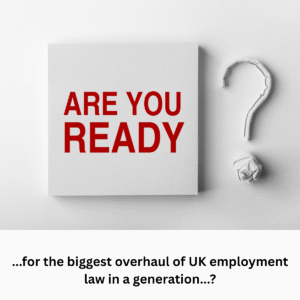Employment Law changes all the time, workplaces introduce new policies and procedures, people come and go. Meanwhile, paperwork gathers dust – when was the last time you reviewed all your HR paperwork, such as contracts of employment and employee handbooks?
Contracts of Employment
The start of a new year can be a good time to make sure everything’s up to date, particularly this year, which sees changes from 6th April to what must be included in an employment contract or written statement of terms and conditions. Also from 6th April, you must provide a contract or written statement to all workers and employees on or before day one of employment – there will no longer be an eight-week ‘grace’ period, so don’t leave it until the last minute!
- Are your contracts well-drafted and up to date?
- Do they protect you, the employer, by including things such as a variation clause, deductions from wages and a pay in lieu of notice clause?
- Do they comply with the new requirements in force from April?
- Have you got a signed copy? Many clauses (such as deductions from wages and restrictive covenants) are extremely difficult, if not impossible, to enforce if the contract hasn’t been signed.
Employee Handbook
Rather than a dusty document on a shelf, the employee handbook should be regularly reviewed and updated, and everyone should read it (not the most riveting read, I grant you, but important all the same!). We frequently see handbooks which are years out of date in areas such as retirement ages, flexible working and the various forms of parental leave.
- Is your handbook up to date and compliant with current legislation?
- Does it align with your contracts? We’ve seen several cases where there was a clear contradiction between the two!
- Has everyone read it and signed to confirm that they have?
- Is a copy easily accessible to anyone who wants to refer to it (physically and/ or electronically?)
Right to Work in the UK
You should conduct right to work checks on ALL new employees and keep copies of relevant documents and dates. If you inadvertently employ someone illegally and don’t have the correct paperwork to provide a ‘statutory excuse’, penalties can be punitive. Click here for the latest guidance.
With Brexit imminent, remember that EU citizens will become subject to the same restrictions as all other overseas workers once the transition period ends. Make sure any current EU employees apply for settled status for themselves and families in good time – the deadline is 31st December 2020 if the UK leaves without an agreement in place, otherwise 30th June 2021. Find out more about applying for settled status.
…in with the New!
Not sure whether you’re up to date and complying with the law? Contact us for a free, no-obligation review of you contracts and handbook. Email info@eightlegal.com or call 01242 570161.
Please note – the information in this article is for general guidance only, and is not a substitute for specific legal advice in any particular situation.


